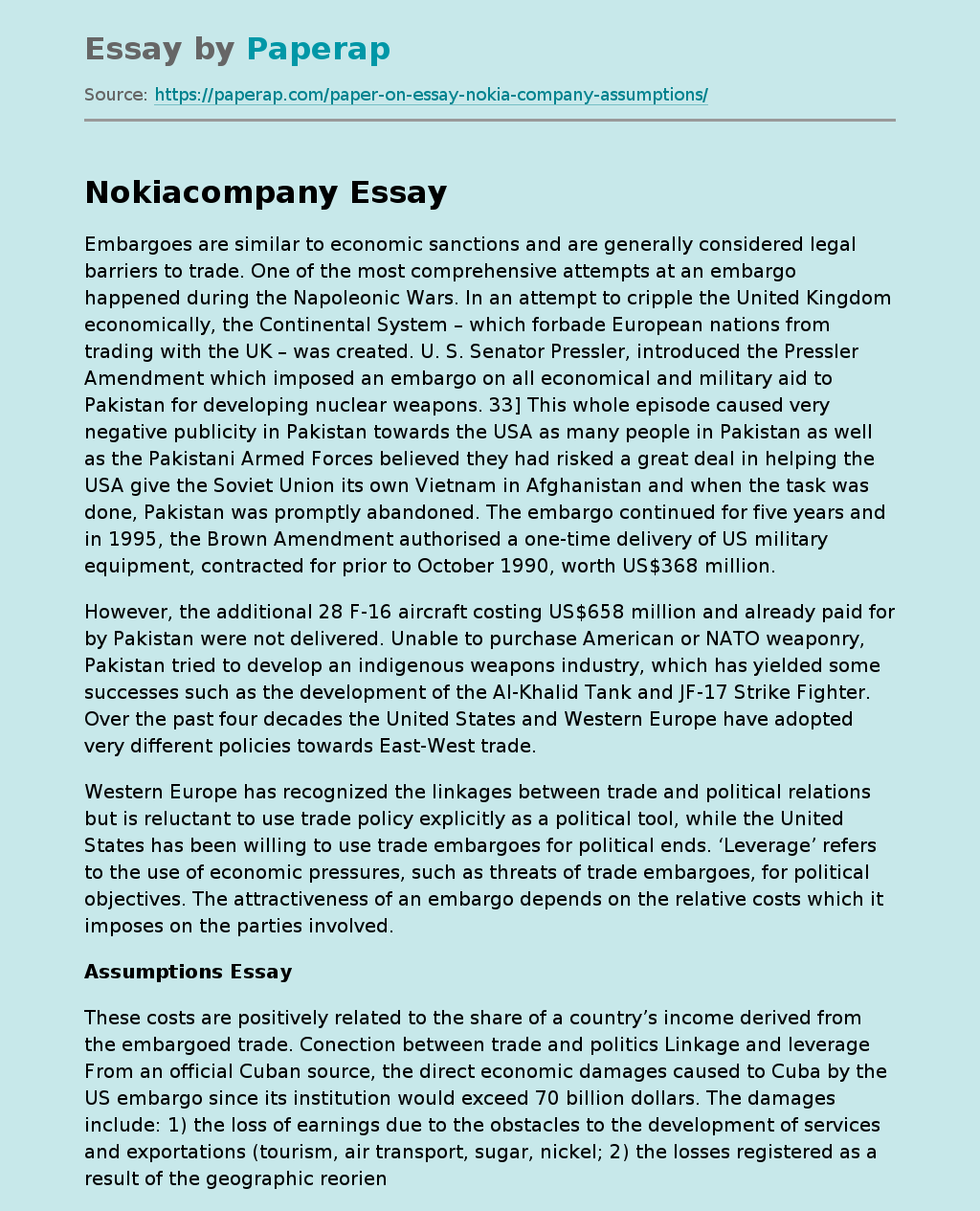Imposing an Embargo on the Country’s Economic System
Embargoes are similar to economic sanctions and are generally considered legal barriers to trade. One of the most comprehensive attempts at an embargo happened during the Napoleonic Wars. In an attempt to cripple the United Kingdom economically, the Continental System – which forbade European nations from trading with the UK – was created. U. S. Senator Pressler, introduced the Pressler Amendment which imposed an embargo on all economical and military aid to Pakistan for developing nuclear weapons. 33] This whole episode caused very negative publicity in Pakistan towards the USA as many people in Pakistan as well as the Pakistani Armed Forces believed they had risked a great deal in helping the USA give the Soviet Union its own Vietnam in Afghanistan and when the task was done, Pakistan was promptly abandoned.
The embargo continued for five years and in 1995, the Brown Amendment authorised a one-time delivery of US military equipment, contracted for prior to October 1990, worth US$368 million.
However, the additional 28 F-16 aircraft costing US$658 million and already paid for by Pakistan were not delivered.
Unable to purchase American or NATO weaponry, Pakistan tried to develop an indigenous weapons industry, which has yielded some successes such as the development of the Al-Khalid Tank and JF-17 Strike Fighter. Over the past four decades the United States and Western Europe have adopted very different policies towards East-West trade.
Western Europe has recognized the linkages between trade and political relations but is reluctant to use trade policy explicitly as a political tool, while the United States has been willing to use trade embargoes for political ends.
‘Leverage’ refers to the use of economic pressures, such as threats of trade embargoes, for political objectives. The attractiveness of an embargo depends on the relative costs which it imposes on the parties involved.
These costs are positively related to the share of a country’s income derived from the embargoed trade. Conection between trade and politics Linkage and leverage From an official Cuban source, the direct economic damages caused to Cuba by the US embargo since its institution would exceed 70 billion dollars. The damages include: 1) the loss of earnings due to the obstacles to the development of services and exportations (tourism, air transport, sugar, nickel; 2) the losses registered as a result of the geographic reorientation f the commercial flows, (additional costs of freight, stocking and commercialization at the purchasing of the goods…);
3) the impact of the limitation imposed on the growth of the national production of goods and services (limited access to technologies, lack of access to spare parts and hence early retirement of equipment, forced restructuring of firms, serious difficulties sustained by the sectors of sugar, electricity, transportation, agriculture…); 4) the monetary and financial restrictions (impossibility to renegotiate the external debt, interdiction of access to the dollar, unfavourable impact of the variation of the exchange rates on trade, “riskcountry”, additional cost of financing due to US opposition to the integration of Cuba into the international financial institutions…); 5) the pernicious effects of the incentive to emigration, including illegal emigration (loss of human resources and talents generated by the Cuban educational system…); 6) social damages affecting the population (concerning food, health, education, culture, sport…).
If it affects negatively all the sectors, the embargo directly impedes – besides the exportations – the driving forces of the Cuban economic recovery, at the top of which are tourism, foreign direct investments (FDI) and currency transfers. Many European subsidiaries of US firms had recently to break off negotiations for the management of hotels, because their lawyers anticipated that the contracts would be sanctioned under the provisions of the “Helms-Burton law”. In addition, the buy-out by US groups of European cruising societies, which moored their vessels in Cuba, cancelled the projects in 2002-03. The US embargo of Cuba is directed at its communist system and its supporters.
That system that is a declared enemy of the US, that is capable of committing physical and moral harm, that does not respect anything or anyone, that is a liar, that is a murder , demonic and deserving of being eliminated. The partial embargo only manages to limit the spread of communism, to change the current system, it is necessary to denounce and confront it. But not taking action and forgetting will only manage to prolong the suffering of the Cuban people. The embargo has been most effective in the last few years due to the end of Russia’s aid to Cuba. This economical aid provided to Cuba is estimated to be 70 to 120 billion dollars. This aid is larger than that received by all of Latin America. It would also be necessary to include military aid in these numbers, however, it has not been possible to put a dollar amount on this type of aid.
Imposing an Embargo on the Country’s Economic System. (2019, Dec 05). Retrieved from https://paperap.com/paper-on-essay-nokia-company-assumptions/

